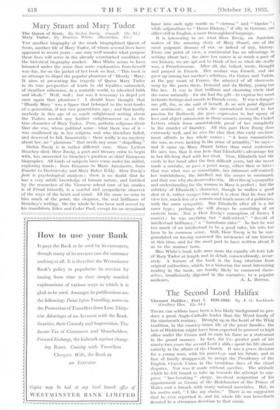Mary Stuart and Mary Tudor
YET another biography of the much biographized Queen of Scots, another life of Mary Tudor, of whom several lives have appeared in recent years : one may well wonder what purpose these lives will serve in the already overstocked condition of the historical biography market. Miss White seems to have laboured under the sense that some explanation front herself was due, for on the jacket of her book we find,." This book is an attempt to dispel the popular phantom of ' Bloody Mary. It aims at presenting the tragedy of Queen Mary Tudor in its true perspective of truth to old loyalties outmoded, of steadfast adherence, in a mutable world, to inherited faith and ideals." Well, well ; but was it necessary to dispel yet once again that phantom ? I should have thought that Bloody Mary ' was a figure that belonged to the text-books a a generation, if not two generations, ago ; and that hardly anybody in this age of so much enlightened writing about the Tudors needed any further enlightenment as to the true character of Mary Tudor. Poor, pathetic religious devote that she was, whose political sense—what there was of it— was swallowed up in her religion, and who therefore failed, and deserved to fail, lamentably : there really is no mystery about her, no " phantom " that needs any more " dispelling." Stefan Zweig is in rather different ease. Since Lytton Strachey died, Herr Zweig, a poet and literary critic to begin with, has succeeded to Strachey's position as chief European biographer. All kinds of subjects have come under his skilful, exploring hands ; from Erasmus to Marie Antoinette, from Fouche to Dostoievsky and Mary Baker Eddy. Herr Zweig's forte is psychological analysis ; there is no doubt that he has a very subtle knowledge of human nature, and fortified by the researches of the Viennese school (one of his studies is of Freud himself), is a careful and sympathetic observer of the ways of the heart and mind. All the same we miss in him much of the point, the elegance, the real brilliance of Strachey's writing. On the whole he has been well served by his translators, Eden and Cedar Paul, except for an occasional lapse into such ugly words as " victress " and " bipolar " ; while adjurations to " Dame History," if silly in German, are sillier still in English, a more thoroughbred language. It is interesting to see what Herr Zweig, an Austrian, makes of the amazing story of Mary Stuart, one of the most poignant dramas of our, or indeed of any, history. From one point of view, a continental has an advantage in writing about her ; for since her career is so much a part of our history, wnare apt not to think of her as what she really was, a French-woman. After all, she talked, wrote, thought and prayed in French. Her mother was French, and she grew up among her mother's relatives, the Guises and Valois, at the gay court of France, the admired of all observers, sung by the poets there, lionsard and du Bellay, young too like her. It was in that brilliant and charming circle that she came naturally—for she had the gift—to express her most intimate feelings and moods in French verse. It was a danger- ous gift, for, as she said of herself, Je ne sais point deguiset mes sentiments ; and when she surrendered herself to her passion for Bothwell, she gave expression to her agony of love and abject submission in those sonnets among the Casket Letters which form unmistakable proof of her complicity in the murder of Darnley. All this part Herr Zweig does extremely well, and he sees the clue that this early environ- ment affords to her whole career : " A born romanticist, she was, as ever, lacking in the sense of actuality," he says— and it sums up Mary Stuart better than most sentences. He sees, too, that it was here that Elizabeth's advantage lay in her life-long duel with her rival. True, Elizabeth had the cards in her hand after the first difficult years, but she never made a mistake, or gave a point away, either then or later that was what was so remarkable, her inhuman self-control, her watchfulness, the intellect not the senses in command, and that was why she deserved to win, Herr Zweig's sympathy and understanding for the woman in Mary is perfect ; but the subtlety of Elizabeth's character, though he males a good shot at it, rather escapes him and it is clear that he does not view her, much less of a woman and much more of a politician, with the same sympathy. But Elizabeth after all is a far rarer type ; perhaps she will always be something of an esoteric taste. Nor is Herr Zweig's conception of James I correct ; he was anything but " dull-witted," " devoid of intellectual brilliancy," a " humdrum ruler." In fact he was too much of an intellectual to be a good ruler, his wits too keen to be common sense. Still, Herr Zweig is to be con- gratulated on having mastered the intricacies of our history at this time, and for the most part to have written about it as to the manner born. Miss White's book tells once more the equally oft-told tale of Mary Tudor at length and in detail, conscientiously, accur- ately. A feature of the book is the long citations from original authorities, which, to a historian the most interesting reading in the book, are hardly likely to commend them- selves, insufficiently digested in the narrative, to a popular


























































 Previous page
Previous page